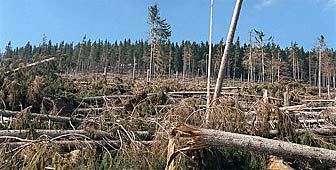
Geneva conference assesses disaster risk

Academics from French-speaking Switzerland and France have been meeting in Geneva to discuss how to predict natural and man-made disasters and reduce their impact.
The conference is organised by CLUSE, which groups the main univerities of western Switzerland (Geneva, Lausanne, Fribourg and Neuchatel) and those of eastern France (Besançon and Dijon), and which, every two years, organises a major cross-disciplinary conference.
Professor Jean-Jacques Wagner says: “In getting together academics from various disciplines, we’re hoping to extract what is common, so we can devise better tools to manage risk.”
The event is concentrating on three main themes: the history and perception of risk; the management of risk; and the role of experts, politicians and public opinion.
“Through the media, we are more aware of what’s going on around the world. But the decision makers are not always in a position to invest in risk-reduction for the benefit of the population,” Wagner told swissinfo.
Nevertheless, the tools often do exist. Professor Wagner led a team from Geneva University which helped to develop a computerised system, known as SERGISAI.
The system can predict the impact of an earthquake in a given area after assessing a wide variety of data such as seismic activity and the vulnerability of the region’s housing and infrastructure.
“It can predict the level of devastation, the number of victims and the cost of reconstruction,” he explains. “It won’t solve all the problems. But it can allow people to make the best possible decision to make the disaster as small as possible.”
Wagner says that in countries where certain natural phenomena happen often – earthquakes in Turkey or flooding in Bangladesh – it should be possible to put in place measures which ensure that next time round there will be fewer victims. The problem is that these countries cannot always afford such luxuries.
In more developed countries there is another difficulty. Switzerland has a major earthquake roughly every 100 years. Because very few Swiss have experienced a big quake, the danger is not at the forefront of people’s minds and there is a less pressing need to implement precautionary measures.
That means that if a major tremor occurred, the consequences could be catastrophic. Such a scenario was observed last December when Hurricane Lothar devastated huge swathes of Switzerland.
Professor Martin Beniston of Fribourg University is studying how global warming might increase the incidence of such extreme weather.
“There’s no way we can say that Lothar was caused by 20th century warming – the interval between these major storms is too great,” Beniston told swissinfo.
“However, as we expect global warming to become more intense in the 21st century, we might see these storms getting closer together, and then we will be able to make the connection.”
Beniston says that if hurricanes or earthquakes become a regular occurrence in Switzerland, then public opinion will become an important factor in getting the decision-makers to act.
“The problem at the moment is that warming is on such a long timescale that it is way beyond the average lifetime of a politician, who will usually try to pass the painful decisions onto his successor,” Beniston says.
“But if you had a series of catastrophic events which you could attribute to a particular cause then people would quickly demand action.”
by Roy Probert

In compliance with the JTI standards
More: SWI swissinfo.ch certified by the Journalism Trust Initiative



























You can find an overview of ongoing debates with our journalists here . Please join us!
If you want to start a conversation about a topic raised in this article or want to report factual errors, email us at english@swissinfo.ch.